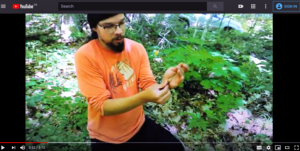Traditional medicine programming maximizes impact on online platforms

By Rick Garrick
PETERBOROUGH — Creators Garden founder and director Joseph Pitawanakwat changed his traditional medicine programming from a community-based model to a variety of online formats due to the coronavirus disease 2019 (COVID-19) pandemic.
“Before, we were completely mobile — we drove everywhere and we would stay in the community,” says Pitawanakwat, a Wiikwemkoong Unceded Territory citizen. “We would travel there and stay there for the week and conduct all of our programming and teaching about all the medicines. Now we’ve had to switch completely online.”
Pitawanakwat says he took two weeks off after all of his scheduled work up to November was cancelled or postponed due to the pandemic in March.
“We invested in some tools that we needed, like cameras and microphones, and we had to adapt all of our programming to online,” Pitawanakwat says. “I did a bunch of research and I ended up landing on a gaming platform called Twitch.”
Pitawanakwat originally did a marathon of broadcasts on the Twitch platform for about two weeks in April and has since posted numerous broadcasts and videos to his site. He usually streams his broadcasts on Mondays and Wednesdays from 6-8 p.m. and on Saturdays at 3 p.m.
“I’m always looking to maximize our impact as a business,” Pitawanakwat says. “I’m always doing everything I can to be as most impactful as I can on human health and environmental health in our communities.”
Pitawanakwat says he was “completely floored” when he realized the impact he was having with the online programming.
“It was something to do with the [COVID-19] lockdown or quarantine and the whole situation,” Pitawanakwat says. “I was having a huge impact on so many different families, first of all being able to present in 50 different communities all at once. Sometimes we were streaming to over 200 different people.”
Pitawanakwat’s Twitch broadcasts are streamed live at no cost, but he also records his broadcasts so his subscribers can watch them on demand. Pitawanakwat also uses Facebook, Youtube, Instagram, Discord and Patreon to deliver his work.
“On our Patreon I do exclusive audio content, so basically podcasts,” Pitawanakwat says. “So many people with low bandwidth in their communities cannot access the livestream [programming], so a lot of people actually rely on the audio-only format.”
Pitawanakwat says he learned about the traditional medicines from his grandmother, who told him “fascinating stories” about plants.
“My great-grandma grew up with no hospital and her role in our community was a midwife,” Pitawanakwat says, noting his grandmother was his great-grandmother’s helper. “So every time I go visit my grandma, I would be asking her to tell us stories about plants.”
Pitawanakwat says he realized the value of his grandmother’s knowledge of plants after his wife bought him a book about medicinal plants, which included information on universities conducting studies on the medicinal properties of plants.
“So we go back to my grandma and try to tell her: ‘You knew this was happening,’” Pitawanakwat says. “And she was just like: ‘No, I just know this medicine works.’”
Pitawanakwat says his grandmother would tell him to go out onto the land to find some of the medicinal plants.
“It ended up getting around in my community that I knew where these plants were so people would ask me: ‘Can you get this medicine for me?’” Pitawanakwat says. “And I would give it to them and they would say: ‘Thank you for that medicine, I’m OK now.’”
Pitawanakwat says he started delivering workshops in Wiikwemkoong and other communities, which eventually evolved into his business.


